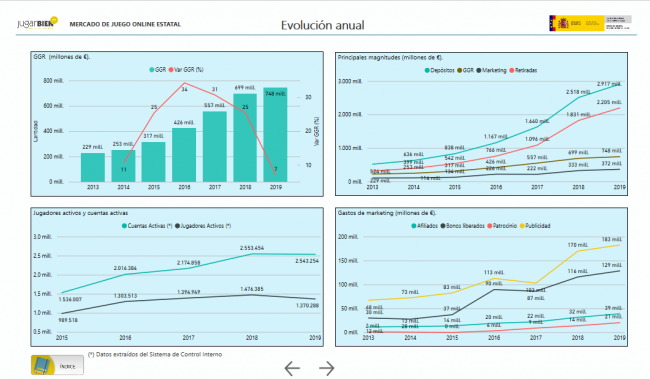Spanish Online Gambling Market
Spain online poker overview
Spain has quite a few well-known and successful poker players. The country was also one of the first European countries to regulate online poker, but there are some unique obstacles.
The European Gaming and Betting Association (EGBA) is an organization set up to try and implement a fair, competitive, and regulated market for online gambling operators wishing to provide their services in Europe. It was created in 2007, originally as the European Betting Association and is based in Brussels. The Spanish Gaming Act, also known as Law 13/2011, regulates all gaming in Spain. As briefly touched on above, this statute is very tough on online poker operators. They are required to jump through numerous hoops just to obtain a license. Fine Spanish food and wine from traditional and artisan producers. Over 800 items, from jamon, chorizo and Manchego, to paella ingredients, tapas, and desserts. T Gaming Interactive has been granted its license for the Spanish online market. A broad range of the company's world-class online casino games will be soon live and available in Spain. After gaining certificate for the Italian market recently, CT Gaming Interactive is now further cementing its presence in the European online gaming market. Spanish Regional Governments to Adopt Central Gambling Self-Exclusion Registry to Ensure Better Customer Protection September 26, 2020 The 17 autonomous communities of the Spanish regional governments have agreed to join forces in developing what they described as a central self-exclusion registry to cover both retail and online gambling.
The good news for players is that there are some great options to play. This guide helps you understand this market and how to get dealt in on the action – depositing, withdrawing, bonus offers, tournaments, cash games, and much more.
Scroll down for every subject imaginable when it comes to hitting the tables online in Spain.
| Poker Site | Online | Cash | 24 H Peak | 7 Day avg | Last Week | Play Now |
|---|---|---|---|---|---|---|
| 888poker.es | 146 | 48 | 522 | 240 | 448,452,406,447,418,412,390,437,496,426,442,366,366,360 | |
| PokerStars Europe | 374 | 3359 | 1350 | 2609,2696,2567,2546,2243,2238,2268,2452,4276,2350,2355,2157,2064,2274 | Play Now |
Spain marked the third European country to regulate online gambling. Therefore, it comes as no surprise that current Spanish regulations are based on French and Italian solutions.
Spanish online gambling laws are very strict when it comes to dealing with rogue operators. However, that hasn’t discouraged offshore sites based in locations like Puerto Rico from offering services to Spanish poker enthusiasts. Consequently, regulated sites operating on the local fenced market constantly compete for traffic.
Spain online poker laws
The Spanish Gaming Act, also known as Law 13/2011, regulates all gaming in Spain. As briefly touched on above, this statute is very tough on online poker operators. They are required to jump through numerous hoops just to obtain a license. Then, they must also pay a 15 percent tax on gross game returns. Finally, they’re supposed to block players from outside of Spain from accessing their networks.
Sites that offer their service to Spaniards without obtaining a valid Spanish license first can be hit with fines ranging from $1 million to $50 million, but the government simply can’t enforce this law when dealing with offshore poker rooms. In turn, this puts local operators at a severe disadvantage.
What is or is not legal in Spain?
Theoretically speaking, Spain residents are required to play on Spain-regulated sites. However, if any regulations are breached, the state does not penalize the player. Instead, authorities are expected to target the operator. The only exceptions to this general rule relate to very specific situations involving fraud, such as using the poker room to carry out money-laundering activities.

All things considered, the Spanish-fenced market is like a high-security prison with no doors. Yes, the guards are mean, the cells are scary, and the guy from across the room is looking at you with a creepy smirk, but you’re free to leave anytime you want. You don’t have to deal with the higher rake, worse bonuses, and a smaller player pool. Thus, it should come as no surprise that plenty of Spanish poker enthusiasts choose to play on sites based outside their country.
Spain and poker-related taxes
Federal law requires players to include winnings from online poker in Personal Income Tax returns. However, Spain allows players to deduct any losses incurred as part of their poker-related activities. Keep in mind that, unlike playing on offshore sites, tax evasion is taken very seriously by the authorities.
PokerStars Europe – a new beginning for the Spanish regulated online poker market?
The Spanish regulated online poker market bled players over the past few years, but it seems the Stars Group found the right moves to reverse this trend. In January 2018, the company made a surprise announcement. PokerStars.es and PokerStars.fr would start sharing liquidity. What’s even more surprising, the new site, called PokerStars Europe, was allowed to accept European players from outside Spain and France.
The new platform quickly grew into a monster, outclassing both 888poker and partypoker in the global traffic rankings. Some people might resent the fact that PokerStars now occupies the first two spots on the leaderboard, but if they’re capable of resurrecting a dying market and bringing quality poker to thousands of players within the space of two weeks, then perhaps they deserve it.
Where can I play poker online in Spain?
Once PokerStars.es and PokerStars.fr started sharing liquidity, picking the right Spain-regulated online poker room became ridiculously easy. The fact that prior to this merge the entire market was in a state of decay does not help the cause of PokerStars’ competitors.
PokerStars Europe
As previously mentioned, PokerStars Europe represents a completely new kind of quality on the regulated Spanish online poker market. For the first time since Law 13/2011 went into effect, Spanish players gained access to a fully-fledged, high-traffic poker site. Perhaps it isn’t as great as what we had back in 2010, but it’s definitely an excellent start.
Whether you’re looking for cash games, single-table tournaments, or multi-table tournaments with enormous prize pools, PokerStars Europe has you covered. The scale of the whole thing is noticeably smaller than in the case of PokerStars’ global site. But traffic is high enough to keep most tables running 24/7.
Aside from the global PokerStars poker room, PokerStars Europe has sister sites in Italy, Portugal, and New Jersey.
888poker.es
888poker.es is fairly big for a site operating on a ring-fenced market. Still, there’s no denying it’s unable to compete with PokerStars Europe. The biggest issue 888poker.es currently faces is that its offer is very similar to PokerStars’. Yet traffic numbers and game quality are much better for the latter. There’s just no real incentive to choose 888 over PokerStars.
This option is pretty much all about Texas Hold’em and low buy-in multi-table tournaments and Sit & Go’s. The games are a little bit softer than on PokerStars, but the difference doesn’t seem to be as pronounced as on the global scene.

Aside from 888poker.es, 888Holdings currently operates two sites: 888poker and 888poker NJ.
iPoker.es
Unfortunately, iPoker.es is the smallest and least impressive offshoot of the iPoker network. The number of active cash game players does not exceed 200, even during peak hours. If it weren’t for the very small number of tables listed in the lobby, the poker room would feel almost abandoned.
iPoker.es customers enjoy the standard iPoker fare: low-limit cash games, low-buy-in tournaments, and low-buy-in S&Gs.
Suffice to say, this company has more successful and popular networks in Italy and France.
partypoker.es
The seven-day average for this partypoker-branded room is seven players. When traffic reaches its peak, this number rises to 23. Essentially, competitors shoved this site out of its market.
If the poker room isn’t empty when you sign in, you might get to play some No-Limit Hold’em.
Judging partypoker by its Spanish operations wouldn’t do it justice, as both partypoker.fr and the global version of the site attract plenty of players. What’s more, Party/Borgata is one of the leading New Jersey sites.
Where can I play live poker in Spain?
Spain has always had a solid live poker scene. The number of active poker rooms spread across the country proves it. Below, find a short list of brick-and-mortar poker venues worth your attention:
- Santandar Poker Room (Plaza Italia, 39005 Santander, Cantabria)
- Bilboa Poker Room (Bilbao, Biscay)
- Tarragona Poker Room (Rambla Vella, 2, 43003 Tarragona)
- Playa De Las Americas Adeje Poker Room (Adeje, Santa Cruz de Tenerife)
- Peralada Poker Room (Carrer de la Torre de Sant Joan, 17007 Girona)
- Poker Comar (Calle Pesca, 5, 37008 Salamanca)
- Casino de la Toja Poker Room (36991 Illa da Toxa, Pontevedra)
- Casino de Ibiza Poker Room (Passeig Joan Carles I, 07800 Eivissa, Illes Balears)
History of online poker in Spain
Spanish Online Gambling Marketplace
Online poker in Spain remained unregulated throughout the entire ’90s. At this time, Spanish players joined the largest international networks in droves. Then, 2011 marked the passing of the Spanish Gaming Act, which came into effect in 2012. The new regulations were extremely strict on poker operators and fairly lenient on players. Therefore, the transition to a fenced market played out in a very predictable manner.
High-profile operators entered the local market with sub-par offers, as they had to compensate for revenues lost in taxes they had to pay to the Spanish government. Players quickly realized these new licensed sites weren’t all that competitive. They also found the regulators couldn’t really enforce these new laws against them. In turn, they started migrating to offshore sites.
Thus, the entire attempt at regulating the Spanish market ended in a spectacular fiasco. The local sites quickly turned into ghost towns, and in 2014, as many as 43 percent of players counted themselves as regulars at offshore sites.
Spanish Online Gambling Marketing
Spanish-licensed online operators achieved a combined GGR of €699m in 2018, a 25.48% increase compared to the previous year, according to figures released by the Dirección General de Ordenación del Juego (DGOJ).

The verticals casino (38.91%), poker (37.05%), betting (18.11%), and bingo (17.40%) all saw significant growth.
Spanish Online Gambling Markets
However, the number of active players increased only 5.24% year-on-year to 1,465,129, while total marketing expenditures soared to €328m, up from €222m in 2017 – a 48% increase.
These figures show that the Spanish online gambling market is quickly reaching maturity, after first being regulated in 2013.
Attracting new players is becoming increasingly costly for operators. The dramatic rise in marketing expenditures in 2018 is obviously not sustainable in the long run.
Equally obviously, the rapid growth in demand of the last few years cannot be expected to continue indefinitely. A market shakeout in the short to medium term appears likely.